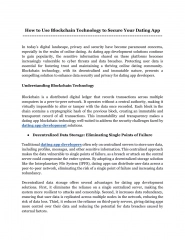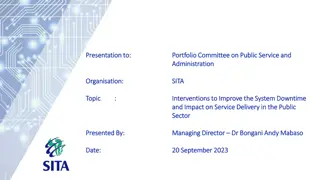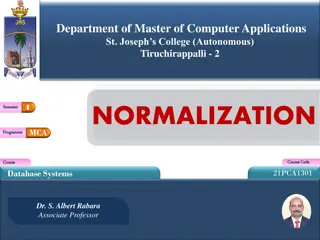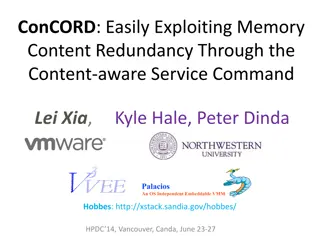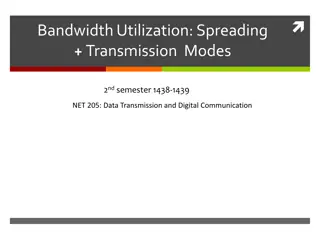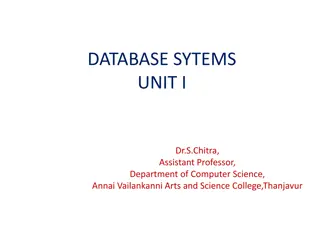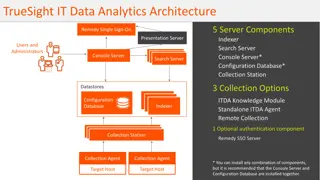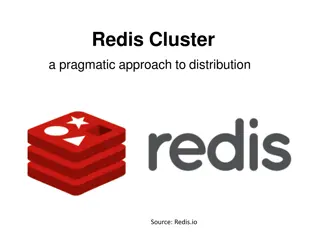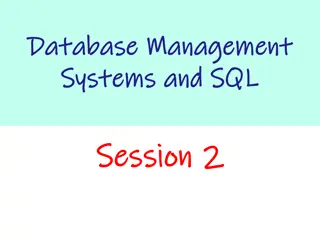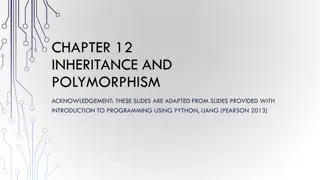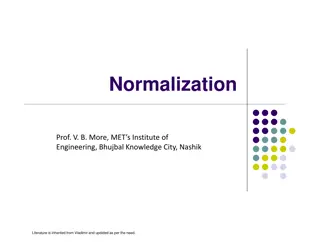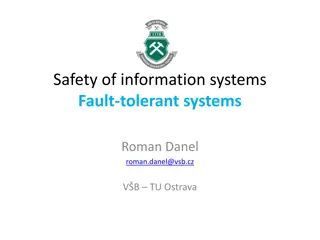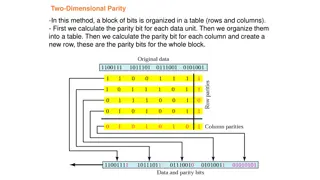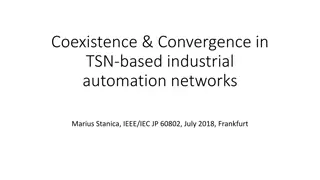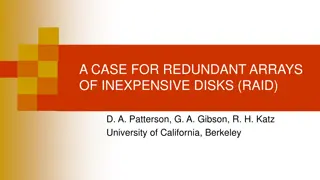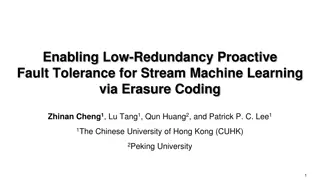Redundancy Masterclass: 8 Tricky Issues and How to Deal with Them
How to handle challenging aspects of redundancy, including employees on maternity leave, discriminatory selection criteria, targeting expensive employees, scoring adjustments for disabled employees, employee disputes, disabled employees at risk, and persuading the board.
0 views • 21 slides
How to Use Blockchain Technology to Secure Your Dating App Data
Discover the transformative power of blockchain technology in securing data for dating app development solutions. Eliminate single points of failure with decentralized storage, boosting redundancy. Ensure immutable integrity, preventing unauthorized modifications to user data. Facilitate secure mess
1 views • 4 slides
Power Distribution in Data Centers Overview
Power distribution and equipment play crucial roles in commercial data center infrastructure, ensuring reliable and efficient operations. Adequate power routing from the grid or generators to data center equipment is vital for stable operations, data integrity, and performance maintenance. This incl
4 views • 19 slides
The Role of Artifacts and Evidence in Educator Evaluation and Support
Exploring the role of artifacts and evidence in educator evaluation, this content covers the three categories of evidence required by the Oregon Framework. It delves into the efficient process that reduces redundancy, essential components of SLG goals, and the types of evidence relevant to professio
0 views • 15 slides
The Importance of Safety Expertise in Aviation Engineering
Safety expertise plays a crucial role in aviation engineering to prevent catastrophic failures. Dr. Mallory Suzanne Graydon from NASA Langley Research Center emphasizes the significance of historical aviation safety incidents, the need for redundancy in parts, and the importance of safety analyses l
4 views • 18 slides
Class 2 Permit Modification Request
This Permit Modification Request (PMR) aims to transition audit scheduling for site recertification from an annual to a graded approach, incorporating DOE Orders and Quality Assurance program requirements. The PMR consolidates scheduling information, reduces redundancy, and clarifies subsequent audi
3 views • 22 slides
Rationalization of statistical data exchange between national and international agencies
The discussion revolves around rationalizing statistical data exchange processes between national and international agencies, focusing on the challenges, principles, and proposed strategies to streamline reporting and dissemination. Key points include the complexity of data flows, burden of internat
1 views • 10 slides
Enhancing System Downtime Solutions in the Public Sector
The presentation addresses the challenges faced by the SITA NGN core network due to infrastructure issues like vandalism and load shedding. It discusses steps taken to stabilize the network, including the procurement of an alternate provider for redundancy. The focus is on improving network availabi
0 views • 34 slides
Leveraging Affordable Technology for Addressing Staffing Challenges in Emergency Services
Discover how automated dispatch processes can help emergency service centers manage dispatcher workload, improve response times, and enhance situational awareness. Learn about the benefits of integrating affordable technology to streamline operations and ensure faster, safer alerting for fire statio
0 views • 14 slides
Introduction to Database Management System Explained
This presentation covers the basics of database management systems, including definitions of data, types of data, structured and unstructured data, storing data in computers using file systems and database systems, and issues with file systems like data redundancy, inconsistency, difficult data acce
1 views • 18 slides
Understanding Database Normalization and Functional Dependencies
Database normalization is a crucial process that aims to improve database design by organizing data into higher forms of normality. This helps in reducing redundancy and ensuring data integrity. Functional dependencies play a key role in defining relationships between attributes in a database. By un
0 views • 33 slides
ConCORD: Exploiting Memory Content Redundancy Through Content-aware Services
Memory content-sharing detection and tracking are crucial aspects that should be built as separate services. ConCORD, a distributed system, efficiently tracks memory content across entities like VMs and processes, reducing memory footprint size and enhancing performance. The implementation involves
0 views • 56 slides
Understanding Spread Spectrum Techniques in Data Transmission
Explore the concepts of bandwidth utilization, spreading, and transmission modes in data transmission and digital communication. Learn about spread spectrum techniques such as frequency hopping and direct sequence spread spectrum, which enable efficient sharing of wireless communication channels. Di
1 views • 28 slides
Understanding Database Systems in IT
Database systems play a crucial role in managing and organizing data efficiently. They provide a structured environment for storing and accessing information, enabling various applications in sectors like banking, airlines, universities, sales, and more. The transition from traditional file systems
3 views • 38 slides
TrueSight IT Data Analytics Architecture Overview
TrueSight IT Data Analytics Architecture provides a comprehensive framework for collecting, indexing, and analyzing data from target hosts. Components like Console Server, Configuration Database, Collection Agents, and more work together to ensure efficient data processing and storage. The architect
0 views • 12 slides
Understanding Redundancy in the Workplace
This 3-day course on dealing with redundancy covers topics such as the definition of redundancy, employee rights, consultation processes, alternatives to redundancy, and more. Participants engage in activities to discuss tasks related to redundancy and explore the Employment Rights Act 1996. The cou
0 views • 15 slides
Understanding Redis Cluster Distribution Approach
Redis Cluster offers a pragmatic approach to distribution, connecting all nodes directly with a service channel. Each node communicates using a binary protocol, optimized for bandwidth and speed. Nodes do not proxy queries, and communication involves messages like PING, PONG, and Gossip. Hash slot k
0 views • 17 slides
Understanding Database Normalization Process
Database normalization is a crucial process that helps in organizing data efficiently by reducing redundancy and dependency issues. It involves steps like identifying keys, removing repeating attributes, and transforming data into different normal forms. Each step aims to enhance data integrity and
0 views • 19 slides
Update on Negotiated Rulemaking Committee (NRMC) Recommendations for Higher Education Data Requests
The update covers the proceedings and recommendations of the Negotiated Rulemaking Committee (NRMC) regarding data requests in higher education. The NRMC, formed under Texas Education Code, reviewed and proposed modifications to 93 data requests, aiming to streamline and optimize data collection pro
1 views • 24 slides
Global Relevance and Redundancy Optimization in Multi-label Feature Selection
The study focuses on optimizing multi-label feature selection by balancing global relevance and redundancy factors, aiming to enhance the efficiency and accuracy of data analysis. It delves into the challenges posed by information theoretical-based methods and offers insights on overcoming limitatio
0 views • 15 slides
Understanding Database Management Systems and Keys in SQL
This content discusses the importance of organizing data into multiple tables within a database management system, the concept of keys and foreign keys, and the potential issues of data redundancy. It also covers examples of structured data related to products, orders, and manufacturers.
0 views • 55 slides
Understanding Inheritance and Polymorphism in Python
Exploring the concept of inheritance in object-oriented programming, specifically in Python, to create a hierarchy of classes where subclasses inherit attributes and methods from a superclass. This approach helps to avoid redundancy and promotes code reusability. The relationship between superclasse
0 views • 11 slides
Understanding Normalization in Database Management
Normalization is a crucial database design technique used to organize tables efficiently, reduce data redundancy, and prevent anomalies in data operations. This process involves decomposing larger tables into smaller, linked tables to ensure consistency and ease of data management.
1 views • 59 slides
Understanding Fault-Tolerant Systems and Data Recovery Strategies
Explore the concepts of fault-tolerant systems, disaster recovery, high availability, and database technologies for ensuring the safety of information systems. Learn about uptime, downtime, MTBF, and MTTR, along with IBM's disaster recovery layers and solutions like redundancy, replication, and dive
1 views • 27 slides
A Comprehensive Review of ACT English Section Tips
Master essential strategies for the ACT English section, covering topics like redundancy, sentence fragments, punctuation usage, and context clues. Learn how to approach different question types efficiently and increase your chances of success in the test.
0 views • 44 slides
Understanding Database Normalization: A Comprehensive Guide
Database normalization is a crucial process in database design to eliminate data redundancy and anomalies. This guide covers the definition of normalization, types of normalization including 1NF, 2NF, and more, along with examples and explanations on achieving each normalization form.
1 views • 22 slides
Understanding Database Normalization Techniques
Database normalization is a crucial technique for organizing data efficiently to eliminate redundancy and anomalies. It involves decomposing tables to ensure data integrity and minimize inconsistencies. Common issues without normalization include excessive memory usage and data manipulation problems
4 views • 21 slides
Optimizing Ethernet Communication with PRP and HSR Redundancy Protocols
Explore how to optimize Ethernet communication using Parallel Redundancy Protocol (PRP) and High-availability Seamless Redundancy (HSR) protocols. PRP is ideal for connecting a large number of IEDs with the same application, while HSR is preferred for smaller networks with a single ring topology. Di
0 views • 23 slides
Data Error Detection Techniques Overview
Two-dimensional parity and Cyclic Redundancy Check (CRC) are data error detection methods used to ensure data integrity during transmission. Two-dimensional parity involves organizing bits in a table to calculate parity bits for data units and columns, while CRC appends a string of zeros to the data
0 views • 20 slides
Coexistence & Convergence in TSN-based Industrial Automation Networks
This document explores the coexistence and convergence aspects in TSN-based industrial automation networks, discussing topics like configuration models, traffic shaping mechanisms, network redundancy, and seamless/non-seamless solutions. It delves into the problem statement of configuring TSN featur
0 views • 8 slides
Cloud Load Balancing Overview and Requirements
This content provides a detailed overview of cloud-scale load balancing, involving components like servers, hypervisors, VMs, VIPs, DIPs, and the role of load balancers in distributing workloads efficiently. It also discusses communication flows involving VIPs, DIPs, front-end VMs, back-end VMs, and
0 views • 35 slides
Understanding Redundant Arrays of Inexpensive Disks (RAID)
This informative material discusses the concept of RAID, its various levels such as RAID 0, 1, and 2, their advantages and disadvantages, and the motivation behind implementing RAID systems. It highlights the need for data redundancy, disk throughput optimization, and reliable storage solutions usin
0 views • 30 slides
Understanding Reed-Solomon Encoding: Basics and Applications
Messages consist of symbols from an alphabet and can face erasures and errors during transmission/storage. Redundancy is introduced in codewords to handle these faults, with schemes like 2x and 3x redundancy. Parity bits help detect/correct errors in binary messages efficiently, offering a cost-effe
0 views • 130 slides
Understanding Matching Keys in Database Systems
Matching keys play a crucial role in identifying the same real-world entities in database systems. They specify which attributes to compare and how to compare them, helping minimize redundancy and improve data accuracy. This summary discusses relative candidate keys, minimal matching keys, and relia
0 views • 13 slides
Improving Wireless Performance Through Content Overhearing Refactoring
Explore the concept of refactoring content overhearing to enhance wireless performance by focusing on throughput, leveraging overheard packets, suppressing duplicate data, and identifying sub-packet redundancy. Benefits of this approach include operating at finer granularity, redundancy elimination
0 views • 30 slides
Enhancing Erasure-Coded Storage with Repair Pipelining
Erasure coding is a powerful redundancy technique for distributed storage systems, offering fault tolerance and reduced redundancy compared to replication. This paper discusses the concept of erasure coding, its practical applications, and challenges such as repair penalties. It explores innovative
0 views • 21 slides
Lazy Code Motion and Partial Redundancy Elimination in Optimizing Compiler
Lazy code motion, partial redundancy elimination, common subexpression elimination, and loop invariant code motion are optimization techniques used in compilers to improve code efficiency by eliminating redundant computations and moving code blocks to optimize performance. These techniques aim to de
0 views • 35 slides
Understanding HITS: Connecting Data Centers, Applications, and Redundancy
Explore how HITS interconnects data centers, supported applications, and redundancy strategies in IT services. Learn about network diagrams, tier level requirements for data centers, supported applications by department, and the SAP ecosystem. Dive into concepts like redundancy versus non-redundancy
0 views • 8 slides
Low-Redundancy Proactive Fault Tolerance for Stream Machine Learning
This study focuses on enabling fault tolerance for stream machine learning through erasure coding. Fault tolerance is crucial in distributed environments due to worker failures, and existing approaches like reactive fault tolerance and proactive replication have drawbacks. The use of erasure coding
0 views • 20 slides
Network Design Challenges and Solutions
This content discusses various network design challenges such as high bandwidth servers, distributed clients, redundant communication setups, and proposes solutions like SDN implementation, HSRP for first hop redundancy, and ND for system rescue. It explores the implications of disrupting first hop
0 views • 9 slides

